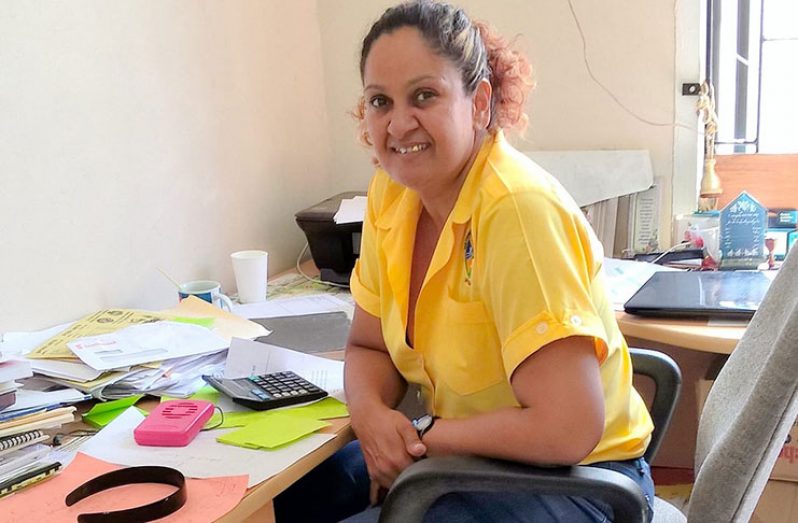– In protecting your children on the roadways
ALTHOUGH the road traffic laws in Guyana do not specifically mandate parents to secure their young children via a car seat or backseat belt, “common sense” should dictate that they find a means to keep these little ones safe while using the roadways.
Coordinator of the Guyana National Road Safety Council (GNRSC), Ramona Doorgen, made this point during an interview with the Pepperpot Magazine a few days ago at her office on Barrack Street, Kingston.
It is a constant eyesore when parents allow their toddlers and young children to occupy the front seat of a vehicle, to sit on their lap while driving, and to fasten themselves in the middle of the driver’s and passenger seat.
The Guyana Road Traffic Act does make provision for a “child restraint system” designed to diminish the risk of injury to a child in the event of a collision or abrupt deceleration of a vehicle by limiting the mobility of the child.
According to the law, the device used for securing the child should be designed “either to be fixed directly to an anchorage point or be used in conjunction with an adult seat belt and held in place by the restraining action of the belt.”
Furthermore, the device should be “fitted in the vehicle by the manufacturer and is of a type which complies with such standards as may be prescribed by the minister by regulations in respect of the shape, quality, construction, installation and assembly of seat belts and other safety belt assemblies and anchorage points and child restraint systems.”
Traffic Chief, Dion Moore, told the Pepperpot Magazine that the ‘child restraint’ law is not currently being enforced by the Guyana Police Force (GPF) and that they are now in sensitisation mode.
Once awareness would have been raised on this matter, Moore said enforcement will begin. He declined to comment on just how much longer the education period will last.
In the meantime, though, Moore is saying that children will naturally practice whatever they see the adults doing. “That’s why adults should do the right thing regarding the use of their cellphones while driving, wearing their seatbelts, and so forth,” he pointed out.
LAW CATERS FOR ‘CHILD RESTRAINT’
Doorgen, a road safety advocate for the past 11 years, recalled that Guyana in the past answered no when the ‘Global Status Report’ was being prepared, and it was asked if there was a law on child restraint in the country. However, it was during the preparation of the report for 2015 that the law was found.
“We never found it in the laws of Guyana but while we were looking for information for the 2015 report, we found it. We never found it. I don’t know why we never did. But we knew there was a need for it because of what we saw happening,” she explained.
Speaking about the practice of leaving a child unstrained in a vehicle, Doorgen noted: “There is potential danger when children are not strapped down to the seat. Even if there’s not a law for children to be strapped down, you should encourage it. Common sense could tell us that if a child is of a certain age and height, the front seat belt would not be able to strap him down securely. The seatbelt is for a particular size and weight and all of that. You don’t need a law to tell you that your child should sit in one place in the car; or a law before you can keep your child safe.
“We went to lots of training showing that when you have a child sitting in the back seat of a car and there’s a crash, even though you’re strapped down in the front seat, that child becomes like a loose bullet. I think we need to stop with this thing of what the law says. We need to think about what is safety for us. Safety begins with us.”
Doorgen said there is now a need to educate the population that a law for child restraint does exist.
She is hoping for the time when the culture regarding the protection of children will change to the extent that even taxi drivers will be mandated to carry a car seat. “We have a million and one taxi services. We can make them change. From the time you call your regular one and he doesn’t have a car seat, you call another who does have one. The next time you call him, you better believe he might have one.”
Doorgen also pointed out that parents have a duty to protect their children. “You can’t vex with children. If I’m alone in the back seat, I go to the edge and the middle and push forward so I can converse with those in front. So it’s our duty to protect them. A child must not be moving around for no reason in a car.”
While the deaths of nine children were reported for 2016 under ‘road accidents’, two have been reported for 2017 so far. And, while not all of them died as a result of poor safety measures in vehicles, Doorgen said the GNRSC aims to be proactive, and not just reactive.
The GNRSC is an auxiliary body to the Guyana Police Force (GPF) and was formed under the Ministry of Public Security.
In observance of ‘Road Safety Month’ (November), overseas-based Guyanese, Amrita Samaroo, daughter of local singer, Celia Samaroo, donated about 12 car seats to the GNRSC for free distribution.




.jpg)









